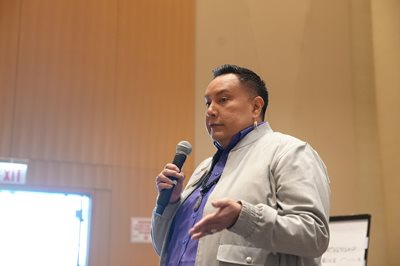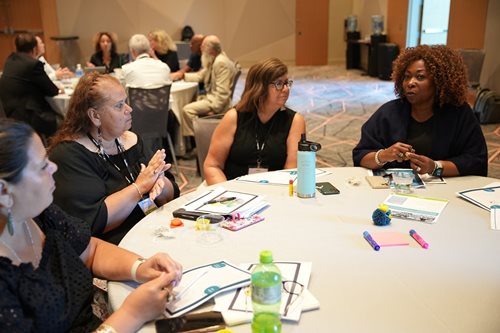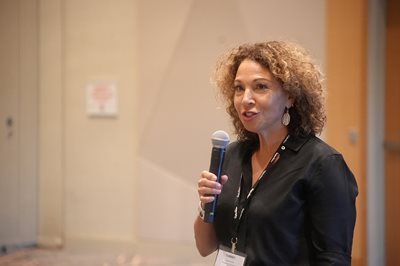Our Native Partnership Gathering, held during the NeighborWorks Training Institute in Chicago, was a chance for network leaders working with Native communities to learn from each other, to build relationships, to share strategies and – perhaps most of all – to talk story. One of my goals in the 15 months I've been director of Native American Partnerships and Strategy (NAPS) has been to help expand our investment and deepen our impact in Native communities. In 2021 and 2022, NeighborWorks America awarded 21 Native Partnership Grants totaling $480,000 to network organizations. During the gathering, I was glad to connect with more than two dozen leaders

We talked about our plans, our progress and our collective strength. We learned together, and I want to share some of my takeaways with you.
State of Indian Housing. The federal investment for housing in Tribal communities is not keeping pace with the overwhelming demand. Funding is stagnant and land reform is needed. Many Tribal organizations and housing authorities can only afford to maintain and operate their current housing stock and they struggle to build new homes. HUD estimated a need for 68,000 homes back in 2017, and we suspect that number is low. With this in mind, tribes must leverage any support to make an impact on the housing need.
Homeownership. Today, a large number of Native Americans are looking for a new place to live but they often lack the credit-building tools that make such a move possible. According to last year's NeighborWorks' Housing and Financial Capability Survey, fewer Native Americans have credit cards (50%) or a checking account (63%) than the rest of the population. And 80% of non-homeowners do not think a bank or credit union will give them a mortgage. At the same time, Native Americans really want to learn more about homeownership and wealth-building tools. This is an area where there's room to grow together and I'm excited about the possibilities.

Wealth building tools. One tool on the horizon, which we should see in the next fiscal year, is the development of a training and technical assistance program to assist tribes and their housing authorities to transition Low-Income Housing Tax Credit (LIHTC) properties into private homeownership. We are funding the National American Indian Housing Council to build this program. There is an estimated 31,000 LIHTC units in Indian Country — moving those units to homeownership is a major wealth building strategy.
Supporting Indian housing leaders. As we work to broaden and expand our impact, programs like the NeighborWorks Achieving Excellence Program can help when it comes to training housing leaders from within the Native community. There is currently a cohort of seven leaders from Native-led organizations who are going through the program. This allows them to learn from the program and each other to strengthen their organizations. I have hopes that this group will continue to meet to exchange ideas and to offer support. I hope the partners at our gathering will do the same.
Strategy. NeighborWorks America has worked hard on our draft of a five-year Native strategy. But we have more to do. We'll continue to fine-tune our strategy over the next three months as we continue learning about the organizations we serve.

Differences and centering Native voices. Every Native community is different – and that means there are different needs in each community. We have to have flexibility to tailor programs. And we must perform this work alongside our Native partners when we're invited in. As many in the group said: "Nothing for us without us," meaning we must center Native voices and Native partners when we are working in and with their communities.
A collective. Along with exchanging ideas, the best part of the convening was being together, learning about each other and our progress. Susan Hammond, relationship manager for Native CDFIs at Fahe, summed up what might be my biggest takeaway when she said, "We don't have to do it alone." She's exactly right. We can rely on each other for support, for ideas, for listening and for stories. The group wants to launch a cohort of network organizations to create a virtual space to share resources, workshop challenges, and build relationships to strengthen this ongoing work.
All in all, NeighborWorks America's first Native Partnership Gathering was a huge success. There is something that happens when we center our work on Native communities. I am not sure how to describe it, but I feel like we instantly start to act like family. I look forward to this work because I am not only ignited about the potential outcomes – I am excited to take this journey together, to learn together, to build community together, and to thrive together.

